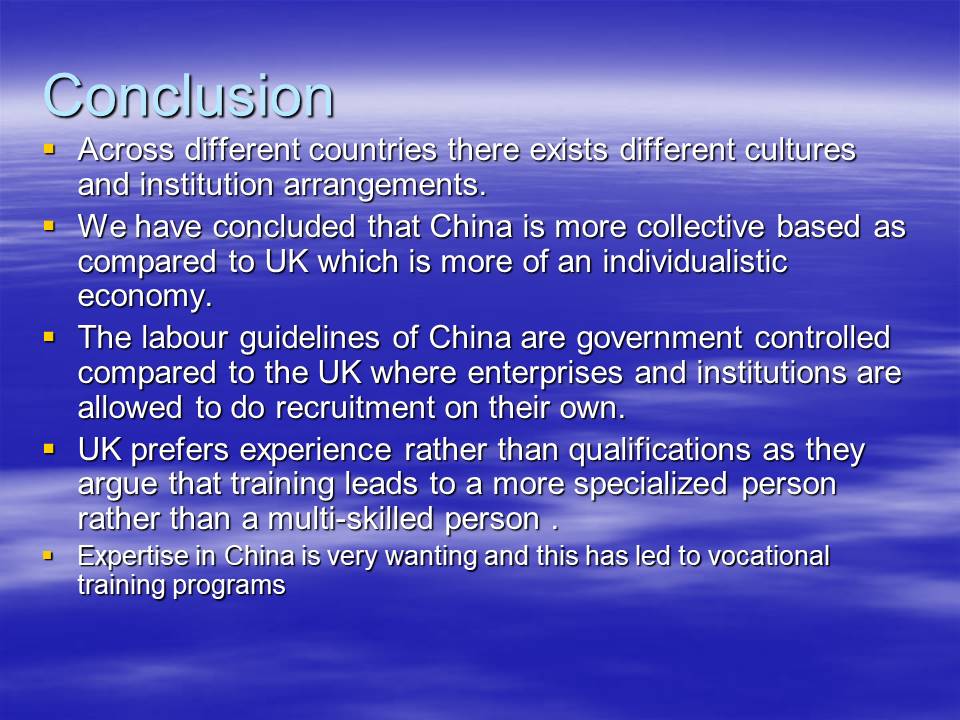Introduction
As the world globalizes so does our cultural and institutional features interact though some refer to globalization as being a “zero sum game”; where some people gain all and others lose all. The exchange of cultural values has been one of the benefits of globalization ( Zhu & Warner, 2004).
Cultural and institutional features are shaped but also constrained by national differences.
Differences in national management culture impede the transfer of HR across countries as will always happen when operating with multinational companies.
In most of the times the distinction between cultural and institutional causation is little because even if institutions are through political and legislative establishments, those that survive do so because of the cultural support (Child & Warner, 2003)
The beliefs, value systems, norms, mores, myths, and structural elements of a given organization, tribe, or society make the culture of that group.
Cultures will be different according to organizations, tribes and even countries thus the expected difference between China and the UK.
Institutions are established rule practices and customers while culture encompasses values, norms and what might broadly be termed as collective cognition.
The importance placed on culture and institutions depends with the organization as these two characteristics influence diffusion of foreign management practices.
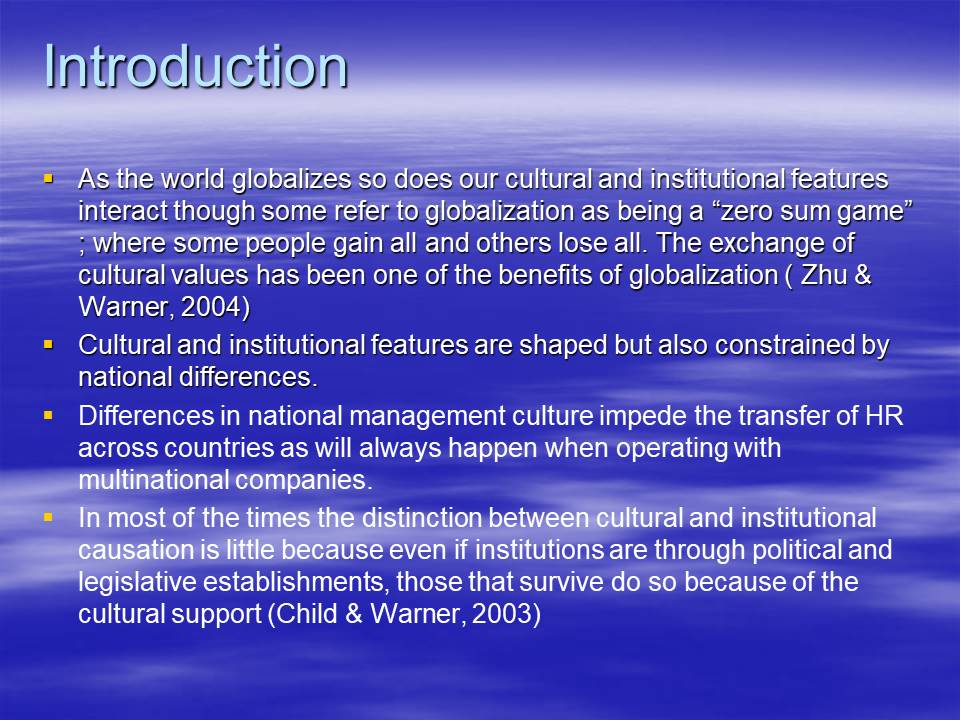
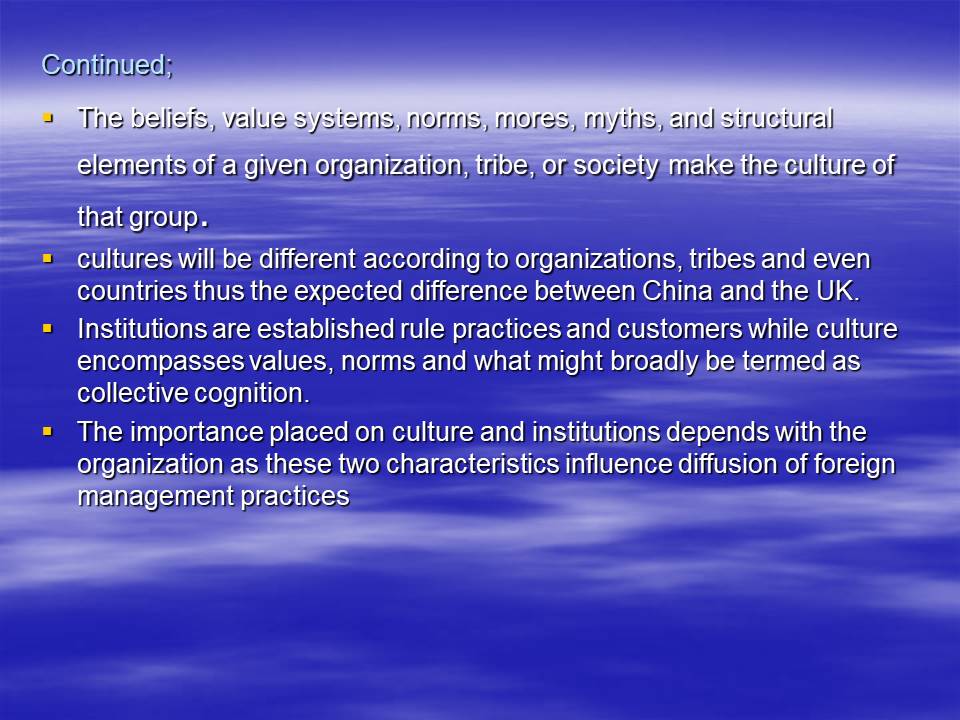
Chinese Culture
High in power distance, low in individualism, moderate in uncertainty avoidance and masculinity, and high in long-term orientation.
Respect for hierarchy and they are more collective compared to the English. Decisions are rarely debated, and leaders never challenged publicly.
Emphasize on relationships importance during decision making process thus avoid conflict and delegates all authority to the appointed leader.
Emphasize on being equal and avoids competitions and conflicts among the players.
Only in the recent past, Chinese have embarked on a mix of collectivism with individualism and low power distance giving their employees more responsibilities and rights (Zhang & Edward, 2003)
In summary Chinese socio-cultural values are reinforced by tacit social norm of solidarity, equality, mutual assistance, honesty, friendship, and obedience to the law. Such norms and values have their roots in the country’s history and ideology and have continued to influence aspects of work behavior and employment relationships in many sectors.
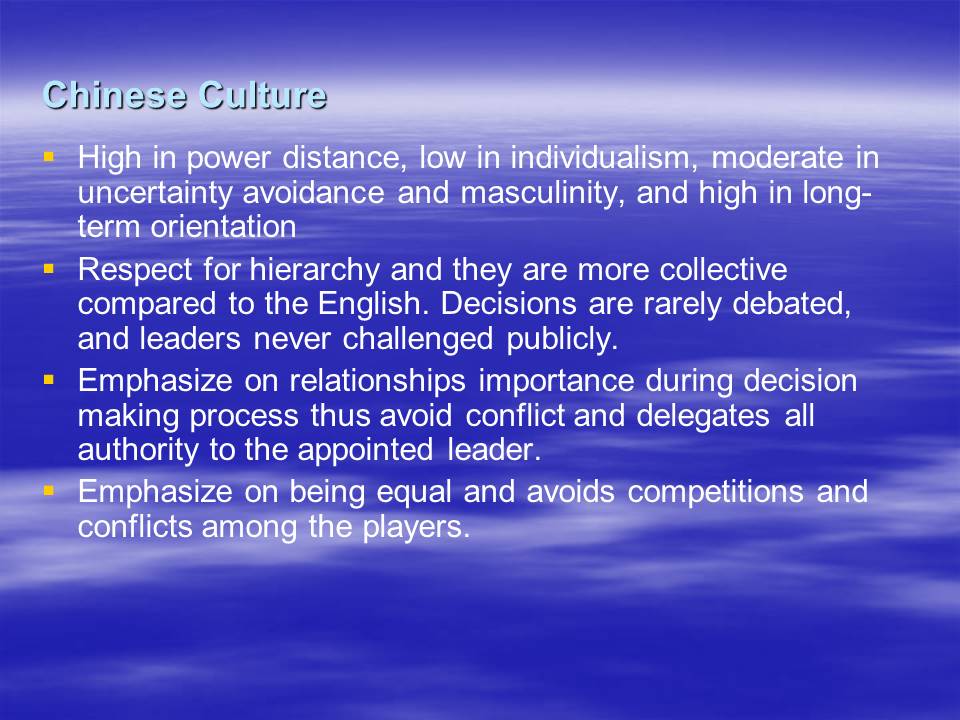
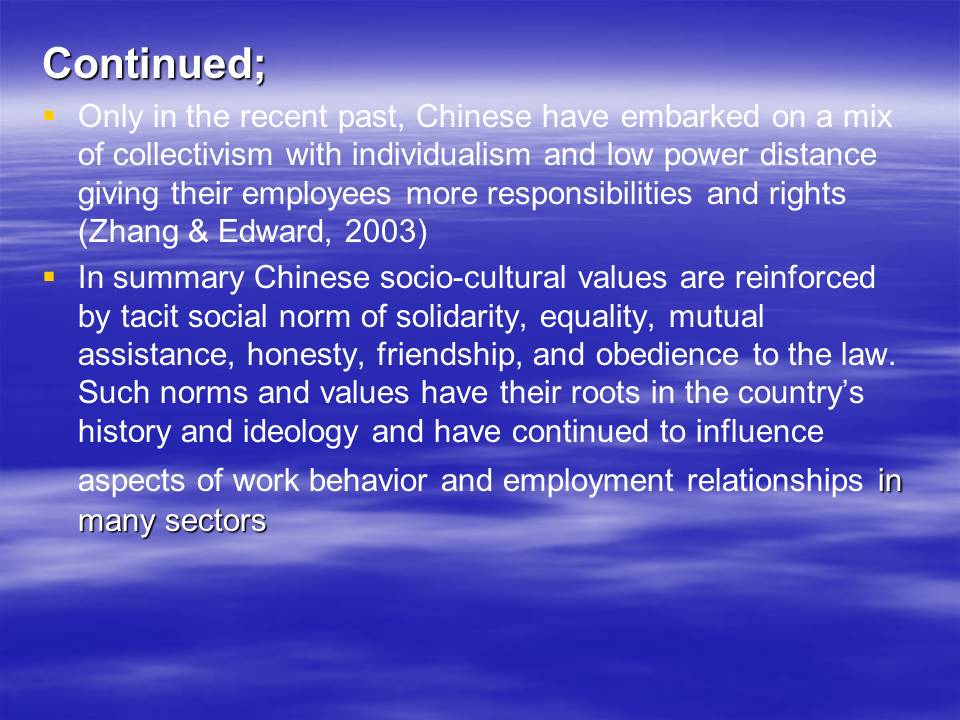
The UK Culture and Institutional Values
Mainly characterized by individualism moderately low on uncertainty avoidance and power distance. High on masculinity or femininity.
Uncertainty, dissent, and risk taking are seen as acceptable and the influence of hierarchy is minimized for the UK cases.
Equality emphasized; sexual roles are clearly defined, and male values of assertiveness, money, and possessions are admired.
By comparison UK managers formulate their business plans without government interference in contrast to the Chinese.
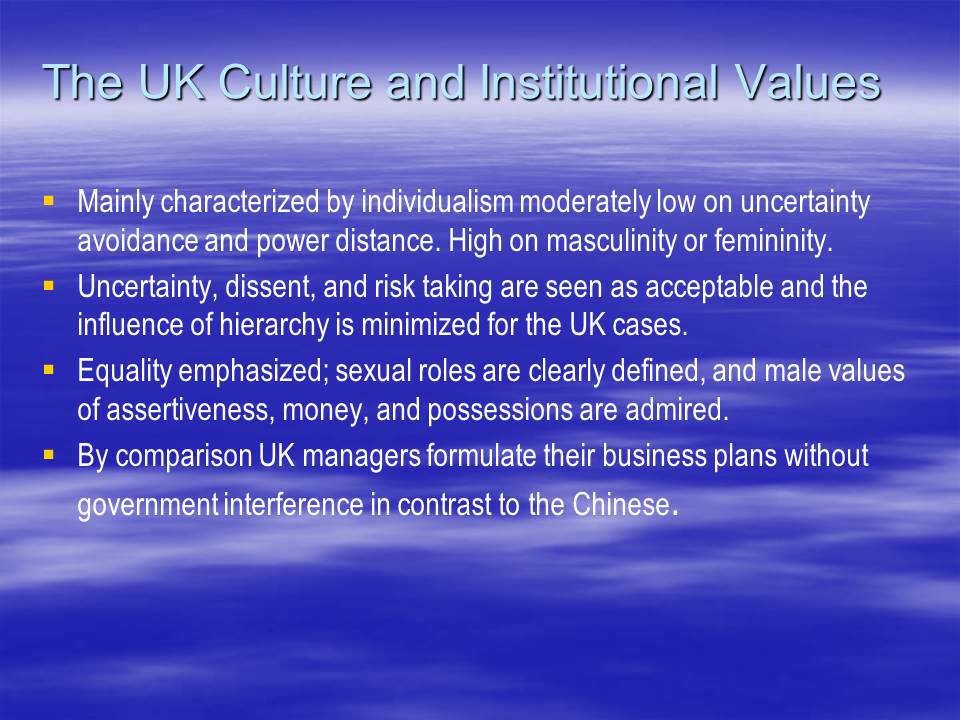
Predominant HR policies and practices China
Those activities an organization undertakes to utilize human resources efficiently. The activities include planning and management among others constitute the HR (Anonymous, 2004).
Most of the HR policies are based on cultural beliefs that reflect the basic assumptions and values of national culture in which societies are strongly embedded in( Myloni, Wil Harzing & Mirza, 2004). The following are the common HR practices:
- Human Resource Planning: Enterprises have been given the power to hire and fire. However the government policies prevent the enterprises from implementing the human resource planning.
- Recruitment and Selection: For state owned companies, control was exercised through the government unified job assignment on labour and labour allocation depriving institutions the required autonomy during the hiring.
- Perfomance Appraisal: Evaluations are always aimed at measuring an individual’s worth in an organization. In many cases it has not been conducted through a systematic basis thus leading to reduced significance of performance and also the slow down in compensation reforms in the country.
- Compensation: Unlike non state owned companies, state owned companies are unable to increase their wage bills and this hinder chances of making good profits to offer more attractive packages. This brings out the high absenteeism and low productivity.
- Training and development: Training and development is the effort of trying to improve one’s capabilities by learning. Technical skills are below par in china and this has forced the country to establish national wide program of vocational training for all state owned companies.
Trainings are being offered along jobs.
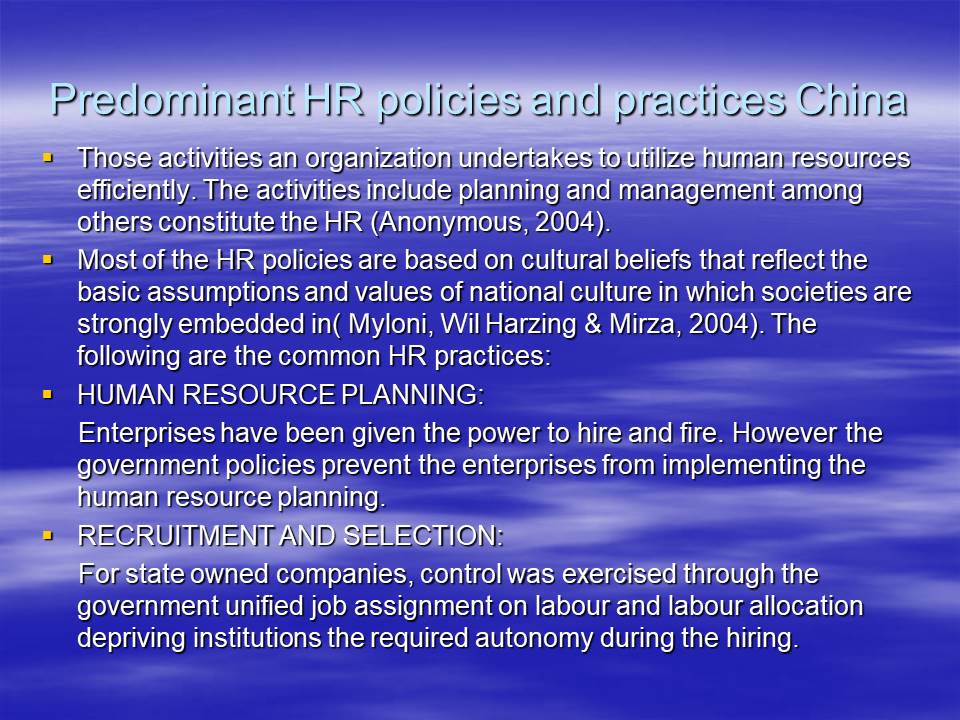
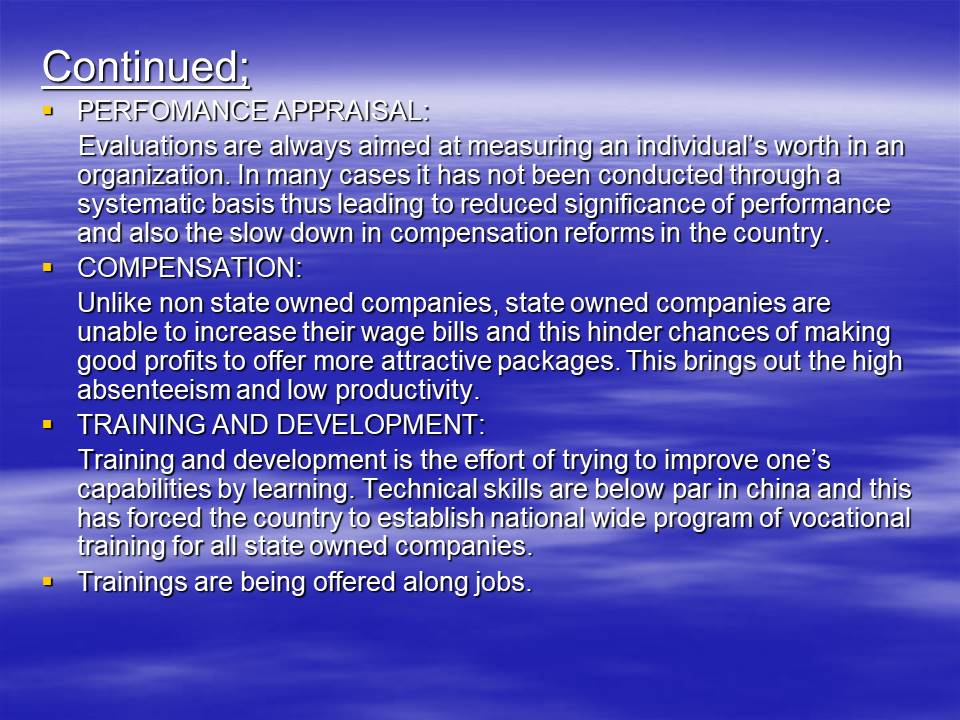
Predominant HR policies and practices UK
Compared to China, UK has the most deregulated labour market with minimal workers and social protection. Many argue that the labour market is among the most flexible but its not known whether legislations bring out the flexibility in the labour market.
Recruitment and Selection: In the UK, recruitment is through informal channels and networks based on the knowledge of the individual. Companies employ different techniques to reduce errors during selections. Large organizations tend to rely on objective qualifications. Technical skills and positive work ethics are among the most considered factors when recruiting.
Training and Development: Enterprises here also rarely carry out formal training needs analysis and no systematic approach to training. Training is perceived to be unaffordable and leads to a highly specialized worker as opposed to a multi-skilled worker who is more preferable.
Perfomance Appraisal: The appraisals vary with firm size and industry sector. Some companies depend on the oral evidence given by the employee and how capable the employee is able to achieve the desired targets. They also assess their employees by rating them according to how they answer specific questions. The managers of the small firms do not give the job requirements as they argue that the requirements make the job incentives too narrow thereby reducing the extent in which organizations can flex their arms when hiring. Employers believe that when the requirements are not too strict, the employees will have loyalty to the company and there will also be chances of new innovations from the employees due to the independence available.
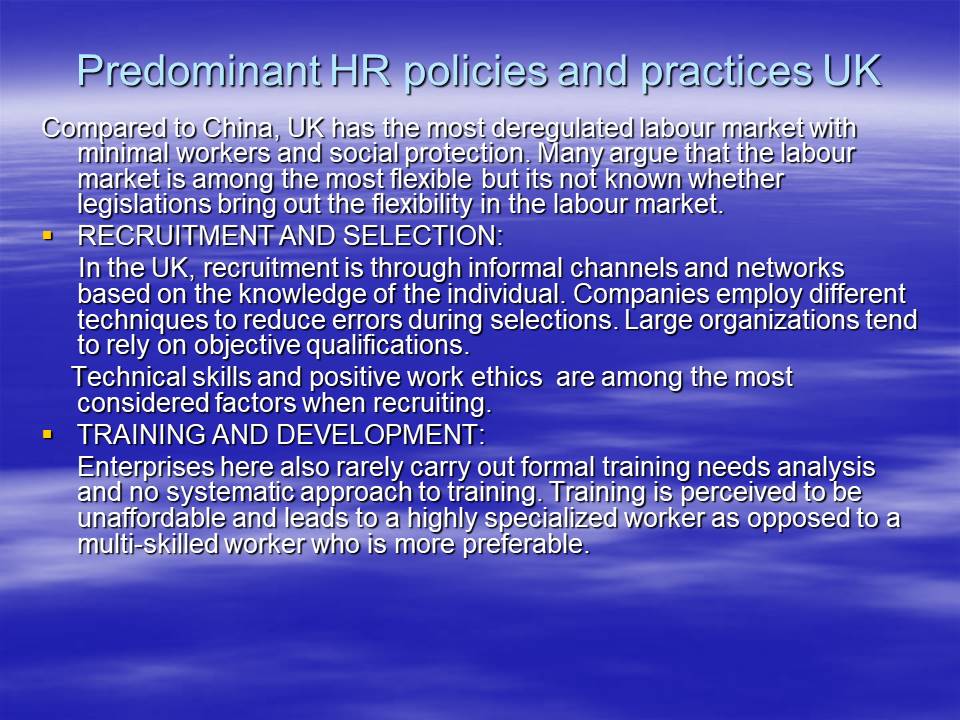
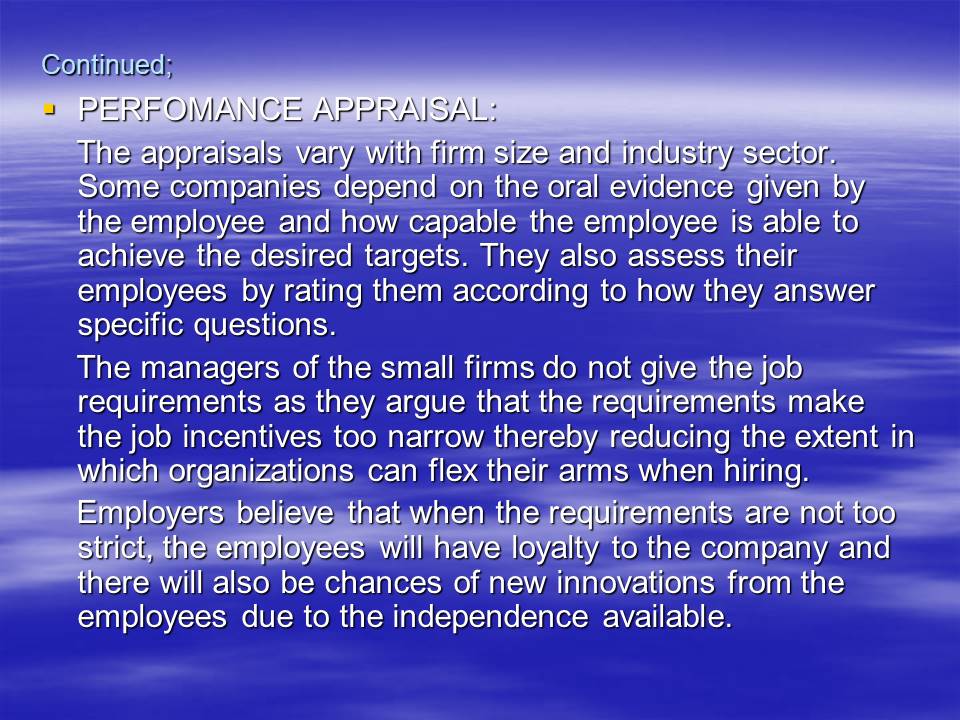
Conclusion
Across different countries there exists different cultures and institution arrangements. We have concluded that China is more collective based as compared to UK which is more of an individualistic economy. The labour guidelines of China are government controlled compared to the UK where enterprises and institutions are allowed to do recruitment on their own. UK prefers experience rather than qualifications as they argue that training leads to a more specialized person rather than a multi-skilled person. Expertise in China is very wanting and this has led to vocational training programs.
